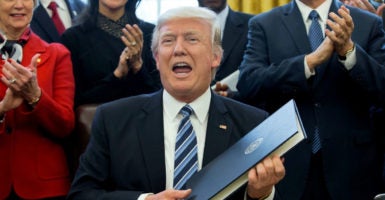Washington talks a tough game about tackling federal spending, but President Donald Trump is beginning to take real action.
On Monday, Trump issued a new executive order that would require the director of the Office of Management and Budget to conduct a review of all executive branch agencies and, in an effort to improve efficiency, effectiveness, and accountability, propose a plan to reorganize governmental functions and eliminate unnecessary agencies and programs.
With the president expected to release a budget later this week that will call for steep cuts to nondefense programs, this executive order shows that he is serious about eliminating government waste, fraud, and abuse and beginning the process of cutting our bloated federal bureaucracy back down to size.
Cutting red tape from the government will help unleash economic growth and enhance individual freedom.
The new directive from Trump could not have come at a better time. On Thursday, after a more than 16-month suspension, the federal debt limit is set to be reinstated at $20.1 trillion.
The gross federal debt currently sits at $19.9 trillion, and the nation will face yet another debt limit crisis later this year. Clearly change is needed.
The fiscal outlook for the country remains gloomy as well.
In January, the Congressional Budget Office released its latest budget and economic outlook for the coming decade. It reported that if the current path is left unchanged, spending over the next 10 years will continue to rise sharply, the annual deficit will reach more than $1.4 trillion annually, and debt will consume nearly 90 percent of the economy.
Decisive, rational action is needed now more than ever to prevent fiscal disaster. Congress cannot continue to delay serious reforms year after year.
Trump’s executive order is necessary because Congress has continued to fall behind on several of its key responsibilities. Much of the growth in wasteful spending can be attributed to the fact that Congress has repeatedly failed to follow the regular order budget process.
Under regular order, Congress authorizes agencies and programs before they receive appropriations. This gives Congress ample time to perform one of its essential functions: providing oversight.
Well-known agencies such as the FBI, Drug Enforcement Administration, State Department, Federal Trade Commission, and Federal Election Commission have not been authorized in decades.
Another part of the regular order process that Congress has continued to ignore is the annual passage of 12 individual appropriations bills. This has greatly contributed to the continuance of wasteful spending.
Each year, appropriations measures are supposed to go through subcommittee markup, full committee markup, floor debate, and the conferencing process between the House and Senate.
This process gives members of Congress numerous opportunities to take a close and careful look at the programs and agencies they are funding, as well as to identify waste. It also provides a chance to examine what the current spending priorities are and make tough decisions about how limited resources should be allocated.
Unfortunately, the last time Congress actually passed all 12 appropriations bills before the end of the fiscal year was 1997. Over the past few decades, Congress has passed fewer and fewer individual appropriations bills and begun to rely on massive continuing resolutions and omnibus bills to fund the government each year.
These bills are often released and passed within a matter of days, leaving almost no time for members of Congress to examine them and allowing for little debate or opportunities for amendment.
In his first two months in office, Trump has sent a clear message that he plans to take on the federal bureaucracy and begin paring back a government that has continued to balloon.
This executive order is an important first step toward significantly reducing the size and scope of government. In the long run, cutting wasteful programs will increase opportunities for all Americans and help spur economic growth.
Hopefully, Congress will follow the president’s lead and work to finally tackle the nation’s long-ignored fiscal problems.





























